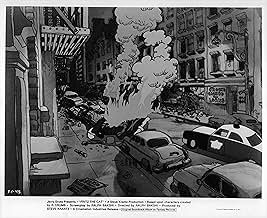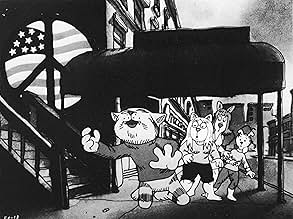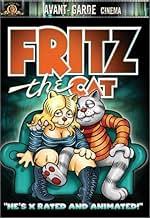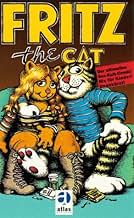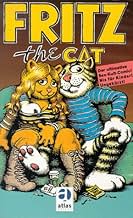In the late 1960s, a pretentious, womanizing young cat drops out of college, starts a riot in Harlem, hits the road with an ex-girlfriend and gets mixed up with domestic terrorists.In the late 1960s, a pretentious, womanizing young cat drops out of college, starts a riot in Harlem, hits the road with an ex-girlfriend and gets mixed up with domestic terrorists.In the late 1960s, a pretentious, womanizing young cat drops out of college, starts a riot in Harlem, hits the road with an ex-girlfriend and gets mixed up with domestic terrorists.
- Fritz the Cat
- (voice)
- Bertha
- (voice)
- …
- Blue
- (voice)
- …
- Winston Schwartz
- (voice)
- …
- Pig Cop #2
- (voice)
- Narrator
- (voice)
- (uncredited)
- …
- Bar Patron
- (voice)
- (uncredited)
- …
- Director
- Writers
- All cast & crew
- Production, box office & more at IMDbPro
Featured reviews
I enjoyed the story: it's about a young guy who discovers the "real" world with all his odd aspects, as the situation was in the late sixties.
The music in this film is super: I discovered the great Charles Earland (Black talk), Duke's Theme from Ray Shanklin, Mamblues (Cal Tjader), Bertha's theme (Ray Shanklin) and even Billy Holiday 's wonderful "yesterdays".
Those who believe there are racist tendencies in the movie don't dig anything about "Jewish" humour.
After having watched this movie, I left the cinema with the conviction:" Hey, in fact I am Fritz the cat ", and believe me, at that time, I was!
Fritz the Cat (1972) is Bakshi's satirical take and social commentary on the 1960's in the United States. Plot wise, it follows the adventures of Fritz the cat (Skip Hinnant) looking to fine the "inner meaning" to life and such. Being a college student, he floats around hopping to different places and experiencing different kinds of people with their ideologies. Also written by Bakshi, the script finds itself bogged down with a hodgepodge of events and underdeveloped motives for the audiences' "protagonist". It's rather unfortunate because the film itself isn't meant to really make Fritz a likable character, but the film also partially fails to provide any sort of understanding as to why he acts the way he acts. It's just Fritz being hypocritical doing things with different people; which was already spoiled in the plot synopsis.
In a way, it feels like Bakshi's version of Alice in Wonderland but grittier and graphic. The audience bumbles along with Fritz on his misadventures watching him try to fit in with all sorts of individuals that in no way fit him. Worst yet, is that Fritz himself feels weightless in his motivations. He just keeps searching, and searching, not really getting to a definitive state of understanding. Fritz is a lost puppy....how oxymoronic. Along his travels, Fritz tries drugs, fornicates with whatever character he finds appealing that he can woo over, joins extremely dangerous cults and causes tensions between different groups of people. All to find that "inner meaning" he so desperately wants to understand. In some ways, it feels like what some of the 1960s were about, but was it that chaotic and scatterbrained?
The acting is fine despite the cast being a very short list. Skip Hinnant as Fritz is fine, he gets the job done adequately. He didn't perform very much after this, returning for The Nine Lives of Fritz the Cat (1974) and I Go Pogo (1980). Rosetta LeNoire also plays the role of Bertha in this film. She does fine for the role while also voicing other characters too. LeNoire would later have roles in The Brother from Another Planet (1984), Gimme a Break! and Family Matters. There are some other actors involved in this production, but their contribution is so little in comparison and they didn't go on to do much later, so it's not worth covering. If there's one thing Bakshi got right, it was making this cartoon directed towards adults because no youth should see the amount of graphic nudity and violence that is in this picture. There's blood, private parts and racial undertones that would not be accepted at all today by any means.
As for the visual aspects, it's a little confusing as to why two cinematographers were needed as this was an animated film. There are some settings where the picture gets rotated but I'm not sure if camerawork was needed for that. As for the animation itself, the colors and movements to the characters are good. The textures to the animation are unique too since it was most likely cell animation. The coloring in every stage of the animation looks like no frame was filled in exactly the same. It's a different look for sure. Lastly the music composed by Ed Bogas was okay for the time and budget it was produced on. Bogas would also go on to compose for The Charlie Brown and Snoopy Show and Garfield and Friends. He would also go onto compose music for video games like Gameboy's Swamp Thing and even the dreaded NES Action 52 cartridge. Very interesting indeed.
As a whole, the movie should be looked at more as a trial in pushing the limits of acceptable animated films. Sadly, this movie tries to make a point but doesn't. The animation, music, social commentary and acting are okay, but the point of it is lost with its haphazard story, overly graphic detail and half-baked script.
As for his movies, many of them are not for children, especially young ones. "Fritz the Cat" is his first, his foremost, and one of his best. But it is rated X, and the first theatrical cartoon to be rated X with all the cartoon nudity, graphic violence, and foul language. Here's a piece of trivia: Would anyone guess that the man doing the voice of Fritz the cat is actually Skip Hinnant, the same guy from the children's PBS educational show "The Electric Company" who played Fargo North, Decoder, and Hinnant worked on "Fritz" and "The Electric Company" in the same year? It's true, two vastly different worlds, but Hinnant has pleased both children and adults, and not necessarily at the same time.
Now let's cut to the movie. It may seem like a dumb adult cartoon, but it does make a statement about the hedonistic lifestyles of the 1960's and there is a lot of allegorical symbolism. Fritz and his fellow felines (looks at his three females in the bathtub scene) represents the sexual revolution, the crows represent low-life Negroes who engage in crime, rioting in Harlem, and pot-smoking, the pigs represent cops who chase Fritz everywhere and are out to bust Fritz, and there's a sadistic witch-like lizard who represents radical culture of the hippies and enjoys watching her rabbit friend beat up Fritz and his donkey girlfriend Harriet with a chain in a sanctuary.
There's something to offend everyone in Fritz, right down to the bathtub orgy in the beginning of the film, heavy dosages of full frontal nudity, hallucinations of bare breasts, Big Bertha, the floozy black crow who seduces Fritz by stuffing marijuana into his mouth, rabbis who get interrupted by Fritz fleeing from the police, a typical 1960's riot in Harlem started by big-mouthed Fritz, pigs as rogue cops (Notice that Ralph Bakshi does the voice of one of the cops who says "Duh. In fact, he mentioned he does all the "Duh" voices in his movies as part of his commentary track from "Wizards." In "Fritz," Bakshi calls his fellow partner, "Ralph," so no one will think that Bakshi is doing the voice of "Ralph," so to speak.), lizards as evil witches, and the list goes on.
The best thing about "Fritz" is that Bakshi seemed to have a lot of fun doing this, and everything worked. He really added the fun to "Heavy Traffic" and "Wizards." When Bakshi really wanted to do an adult animated film, it can work. It only got deadening with latter overproduced efforts such as "Lord of the Rings" and "Cool World," and one can easily see that Bakshi labored everything, rather than the naturalism in "Fritz," "Heavy Traffic" and "Wizards."
Today, adult animation is popular now on TV. In the 1970's, adult animation was used for the theater. Younger animators such as Trey Parker and Matt Stone, the creators of "South Park," and Seth McFarlane, the creator of "Family Guy," appear to be working under the influence of Bakshi, incorporating every bit of lewdness they could think of for their shows and characters. But it is really Bakshi who fathered adult animation, and Parker, Stone, and McFarlane are like his sons, and father knew best.
I was 7 years old when Fritz the Cat first hit the screen, and while I didn't see the film for the first time until I was well into my twenties, the film nevertheless had a lasting impact on my childhood. This film had taken on a reputation of mythical proportions in my Brooklyn hometown neighborhood, partly due to the older teens on my street who were all too eager to share shocking details contained therein, as only the best subversive intentions can do, and further securing the film's status as "every parent's nightmare". To a child about to undergo serious growing pains and a naturally growing curiosity towards all things "adult-related", Fritz the Cat was very much my earliest childhood memory of the themes of sex, drugs, rock-n-roll, racism, you name it, and it was a symbol for naughtiness that all coming of age kids couldn't wait to catch a sneak peak of, or at least couldn't wait to reach the age when we could view such subject matter freely.
As a movie, it hasn't lost any of it's impact in 30 years, and fewer films truly capture the grittiness and raw edge of New York city in the 70's (French Connection is another good example). I dare say that it could be considered more offensive now than ever, as I fear that today many just might not "get it," despite our self-proclamation that we've come a long way in maturity and tolerance of such sensitive issues. Modern society has become so politically correct and desensitized to controversial issues that we're less tolerant and understanding of the original intent of a film such as this, especially when it's messages are not consistent with our modern value system. Thus, some of the obvious stereotypes presented in this film (such as the pigs portraying cops and the crows portraying blacks, for example), could never be presented in a film today. Granted, these images were meant to be offensive in the 70's as well, but they were obviously taken in a different light back then, as they were indicative of a specific brand of biting satire found in the 70's and hippie culture and a reflection of how that particular generation could openly address such social issues. These issues, such as racism, are clearly still relevant today, we just address them in a different manner, which is why Fritz the Cat still has potency yet is more or less looked upon as a curious time capsule of a bygone era today.
Did you know
- TriviaThere is no evidence that Robert Crumb filed suit to have his name removed from the film's credits. Contradictory to this claim, Crumb's name continues to appear in the credits, even on home media releases. His name, however, does not appear in the credits for The Nine Lives of Fritz the Cat (1974).
- GoofsWhen he emerges from the trash can, Fritz's outfit changes color from red to blue to red again between shots.
- Quotes
[Arriving back at his dorm room, where his roomates ignore him]
Fritz: Hello men... everybody all busy studyin' for their goddamn exams and all? Hey Fuz, how'd it go with that Dee Dee chick, huh? She's got some bod' you have to admit... ol' Charlene isn't bad either... like, wow! Heinz, you swine, ol' buddy pig, ya groove behind Alvina and get some kicks tonight, huh?
[Scene fades into black]
Fritz: Bastards... you'd think the goddamn exams was the be-all end-all of existence... the cosmic life-force or somethin'. Can't even say a few decent words to a guy... th' bastards... What a bore... take some bennies an' stay up all night with your face stuck in a bunch of books an' your thumbs up your ass... Yes... yes... I remember the time when it was all very inspiring and enlightening... all this history and literature and sociology shit... You think learning is a really big thing an' you become this big fuckin' intellectual and sit around tryin' ta out-intellectual all the other big fuckin' intellectuals... you spend years and years with your nose buried in these goddamn tomes while out there the world is passin' you by... and all the stuff to see and all th' kicks an' girls are all out there... an' ME, a writer ad a poet who should be havin' adventures an' experiencing all the diversities and paradoxes and ironies of life and passin' over all the roads of the world and digging all the cities and towns and rives and oceans... and making all them chicks!
[Imagines naked woman]
Fritz: As a writer and poet it is my duty to get out there and dig the world... to swing with the whole friggin' scene while there's still time!
[Grabs papers]
Fritz: My farting around days are over! From this day on I shall live every day as if it were my last! Yes! Yes! I must do it! No more the dreary boring classes, the dismal lectures, the sitting around bullshitting with pretentious fat-assed hippies, no more the books, the spoutings of a bunch of old farts who think they know the whole goddamn score!
[Breathes fire]
Fritz: Oh God! What have I done? I've set all my notes and books and stuff on fire and now I can't study for my exams... I'll flunk out and my folks'll be pissed off as hell... I'll get a blanket... the blanket's on fire. We'd better call the fire department.
[We see the roof of Fritz's dorm on fire]
- Alternate versionsWhen aired during the Groundbreakers block on Playboy, the scene of Harriet's rape is heavily edited. The movie is otherwise uncut.
- ConnectionsFeatured in Precious Images (1986)
- How long is Fritz the Cat?Powered by Alexa
Details
Box office
- Budget
- $700,000 (estimated)
- Runtime1 hour 18 minutes
- Color
Contribute to this page



